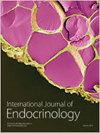Calcium Activation of the Androgen Receptor in Prostate Cells
IF 2.3
4区 医学
Q3 ENDOCRINOLOGY & METABOLISM
引用次数: 0
Abstract
Background. Although prostate cancer patients initially respond to androgen deprivation therapy, most patients progress to a resistant phenotype. Castration resistance is due, in part, to intratumoral and/or adrenal synthesis of androgens, overexpression or mutation of the androgen receptor (AR), stabilization of AR by chaperones, and ligand-independent activation of AR. Increasing evidence also links disruption of calcium homeostasis to progression of prostate cancer. Our previous study shows that heavy metal cadmium activates the AR through a ligand-independent mechanism. Cadmium mimics calcium in biological systems due to their similar ionic charge and radius. This study determines whether calcium activates AR and whether first- and second-generation antiandrogens block the ability of calcium to activate the receptor. Methods. The expression of androgen-responsive genes and calcium channels was measured in prostate cells using a quantitative real-time polymerase chain reaction assay. Cell growth was measured. Results. To ask whether calcium activates AR, prostate cells were treated with calcium in the absence and presence of the first-generation antiandrogens hydroxyflutamide and bicalutamide and the second-generation antiandrogen enzalutamide, and the expression of androgen-responsive genes and cell growth was measured. In the normal PWR-1E cells and HEK293T cells transiently expressing AR, treatment with calcium increased the expression of androgen-responsive genes by approximately 3-fold. The increase was blocked by enzalutamide but was not consistently blocked by the first-generation antiandrogens. In LNCaP cells which contain a mutant AR, treatment with calcium also increased the expression of androgen-responsive genes by approximately 3-fold, and the increase was more effectively blocked by enzalutamide than by hydroxyflutamide or bicalutamide. Treatment with calcium also increased cell growth that was blocked by enzalutamide. To ask whether dysregulation of calcium channels is associated with castration resistance, calcium channels were measured in the normal PWR-1E prostate cells, the hormone-responsive LNCaP cells, and the castration-resistant VCaP and 22RV1 cells. Compared to normal prostate cells, the hormone-responsive and hormone-resistant cells overexpressed several calcium channels. Conclusions. The results of this study show that calcium activates AR and increases cell growth and that calcium channels are overexpressed in hormone-responsive and hormone-resistant prostate cancer cells. Taken together, the results suggest a novel role of calcium in the castration-resistant phenotype.钙激活前列腺细胞中的雄激素受体
背景。尽管前列腺癌患者最初对雄激素剥夺疗法有反应,但大多数患者会发展为耐药表型。阉割耐药的部分原因是瘤内和/或肾上腺合成雄激素、雄激素受体(AR)过度表达或突变、伴侣对 AR 的稳定作用以及配体对 AR 的非依赖性激活。越来越多的证据表明,钙平衡的破坏也与前列腺癌的进展有关。我们之前的研究表明,重金属镉可通过配体依赖性机制激活 AR。由于镉的离子电荷和半径与钙相似,因此在生物系统中镉会模拟钙。本研究确定钙是否能激活 AR,以及第一代和第二代抗雄激素是否能阻断钙激活受体的能力。研究方法使用定量实时聚合酶链反应测定法测量前列腺细胞中雄激素反应基因和钙通道的表达。同时还测量了细胞的生长情况。结果。为了弄清钙是否能激活 AR,在第一代抗雄激素羟基氟他胺和比卡鲁胺以及第二代抗雄激素恩扎鲁胺不存在和存在的情况下,用钙处理前列腺细胞,并测量雄激素反应基因的表达和细胞生长。在正常的PWR-1E细胞和瞬时表达AR的HEK293T细胞中,钙处理可使雄激素反应基因的表达增加约3倍。恩杂鲁胺能阻止这种增加,但第一代抗雄激素不能持续阻止这种增加。在含有突变 AR 的 LNCaP 细胞中,钙处理也会使雄激素反应基因的表达增加约 3 倍,恩杂鲁胺比羟基氟他胺或比卡鲁胺能更有效地阻止这种增加。用钙处理也会增加细胞生长,而恩杂鲁胺会阻止细胞生长。为了弄清钙通道失调是否与阉割抗性有关,对正常的PWR-1E前列腺细胞、激素反应性LNCaP细胞以及阉割抗性VCaP和22RV1细胞中的钙通道进行了测量。与正常前列腺细胞相比,激素反应性细胞和激素耐药细胞过度表达了多种钙通道。结论。本研究结果表明,钙能激活 AR 并促进细胞生长,而且激素反应性和激素耐受性前列腺癌细胞中钙通道过度表达。综上所述,这些结果表明钙在阉割耐药表型中发挥了新的作用。
本文章由计算机程序翻译,如有差异,请以英文原文为准。
求助全文
约1分钟内获得全文
求助全文
来源期刊

International Journal of Endocrinology
ENDOCRINOLOGY & METABOLISM-
CiteScore
5.20
自引率
0.00%
发文量
147
审稿时长
1 months
期刊介绍:
International Journal of Endocrinology is a peer-reviewed, Open Access journal that provides a forum for scientists and clinicians working in basic and translational research. The journal publishes original research articles, review articles, and clinical studies that provide insights into the endocrine system and its associated diseases at a genomic, molecular, biochemical and cellular level.
 求助内容:
求助内容: 应助结果提醒方式:
应助结果提醒方式:


